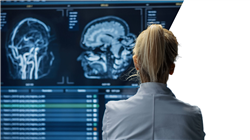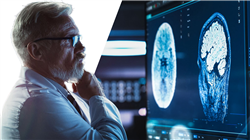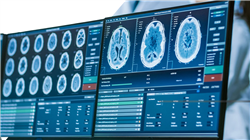University certificate
The world's largest artificial intelligence faculty”
Why study at TECH?
Through this Relearning based Postgraduate certificate, you will master the most innovative techniques of Artificial Intelligence to identify early Neurological Diseases from medical images”

A recent report carried out by the World Health Organization shows that the use of Artificial Intelligence in the interpretation of medical images can reduce by 30% the diagnostic errors in complex pathologies such as Cancer or Cardiovascular Diseases, therefore significantly improving clinical outcomes. In this scenario, professionals must stay at the forefront of the latest advances in this field to optimize patient care considerably and identify a wide range of diseases early.
In this context, TECH designs an exclusive program in Artificial Intelligence Innovations in Diagnostic Imaging. Conceived by references in this field, the academic itinerary will delve into factors ranging from image segmentation algorithms or applications of Artificial Intelligence in Interventional Cardiology to the extraction of clinical features from ultrasound images. In line with this, the study plan will analyze the latest trends in natural language processing in medical image documentation and reporting with Nuance PowerScribe 360. Likewise, the didactic materials will offer the most avant-garde techniques for the follow-up of Chronic Diseases. In this way, graduates will acquire clinical skills to apply tools such as Deep Learning, Convolutional Neural Networks or Deep Learning for the diagnosis of conditions.
In addition, the university program will be based on the disruptive Relearning system powered by TECH and will be accompanied by a variety of multimedia resources, complementary readings and videos in detail. All this from a flexible methodology, which does not follow strict schedules, so that physicians can adjust the academic update to their other professional responsibilities. Along the same lines, all graduates will need is an electronic device with Internet access to immerse themselves in the Virtual Campus and enjoy the most up-to-date teaching materials available on the educational market.
A university program that gives you the opportunity to update your knowledge in a real scenario, with the maximum scientific rigor of an institution at the forefront of technology”
This Postgraduate certificate in Artificial Intelligence Innovations in Diagnostic Imaging contains the most complete and up-to-date program on the market. The most important features include:
- Development of practical cases presented by experts in Artificial Intelligence
- The graphic, schematic and eminently practical contents with which it is conceived gather scientific and practical information on those disciplines that are indispensable for professional practice
- Practical exercises where self-assessment can be used to improve learning
- Its special emphasis on innovative methodologies
- Theoretical lessons, questions to the expert, debate forums on controversial topics, and individual reflection assignments
- Content that is accessible from any fixed or portable device with an Internet connection
Are you looking to develop customized algorithms for automatic diagnosis and disease prediction using medical images? Achieve it with this program in just 6 weeks”
The program’s teaching staff includes professionals from the field who contribute their work experience to this educational program, as well as renowned specialists from leading societies and prestigious universities.
The multimedia content, developed with the latest educational technology, will provide the professional with situated and contextual learning, i.e., a simulated environment that will provide immersive education programmed to learn in real situations.
This program is designed around Problem-Based Learning, whereby the professional must try to solve the different professional practice situations that arise during the course. For this purpose, students will be assisted by an innovative interactive video system created by renowned and experienced experts.
You will achieve your academic goals comfortably, without unnecessary trips to a study center thanks to TECH's 100% online methodology"

You will delve into the automatic generation of radiological reports, which will allow you to improve the accuracy of your clinical evaluations"
Syllabus
This university program has been developed by true experts in Artificial Intelligence Innovations in Diagnostic Imaging. The study plan will delve into the latest advances in areas such as algorithms for medical image interpretation, use of Convolutional Neural Networks in Radiology or noise reduction methods to improve image quality. In addition, the syllabus will delve into how Artificial Intelligence can be used to carry out early diagnosis of Neurodegenerative Diseases such as Alzheimer's disease. Therefore, graduates will obtain advanced clinical skills to master disruptive image processing techniques such as Deep Learning.

You will master advanced techniques such as Deep Learning or Convolutional Neural Networks to detect anomalies in medical images”
Module 1. Artificial Intelligence Innovations in Diagnostic Imaging
1.1. Artificial Intelligence Technologies and Tools in Diagnostic Imaging with IBM Watson Imaging Clinical Review
1.1.1. Leading Software Platforms for Medical Image Analysis
1.1.2. Radiology-Specific Deep Learning Tools
1.1.3. Innovations in Hardware to Accelerate Image Processing
1.1.4. Integration of Artificial Intelligence Systems in Existing Hospital Infrastructures
1.2. Statistical Methods and Algorithms for Medical Image Interpretation with DeepMind AI for Breast Cancer Analysis
1.2.1. Image Segmentation Algorithms
1.2.2. Classification and Detection Techniques in Medical Images
1.2.3. Use of Convolutional Neural Networks in Radiology
1.2.4. Noise Reduction and Image Quality Improvement Methods
1.3. Design of Experiments and Analysis of Results in Diagnostic Imaging with Google Cloud Healthcare API
1.3.1. Design of Validation Protocols for Artificial Intelligence Algorithms
1.3.2. Statistical Methods for Comparing the Performance of Artificial Intelligence and Radiologists
1.3.3. Setting Up Multicenter Studies for Artificial Intelligence Testing
1.3.4. Interpretation and Presentation of Performance Test Results
1.4. Detection of Subtle Patterns in Low-Resolution Images
1.4.1. Artificial Intelligence for Early Diagnosis of Neurodegenerative Diseases
1.4.2. Artificial Intelligence Applications in Interventional Cardiology
1.4.3. Use of Artificial Intelligence for the Optimization of Imaging Protocols
1.5. Biomedical Image Analysis and Processing
1.5.1. Pre-Processing Techniques to Improve Automatic Interpretation
1.5.2. Texture and Pattern Analysis in Histological Images
1.5.3. Extraction of Clinical Features from Ultrasound Images
1.5.4. Methods for Longitudinal Analysis of Images in Clinical Studies
1.6. Advanced Data Visualization in Diagnostic Imaging with OsiriX MD
1.6.1. Development of Graphical Interfaces for 3D Image Exploration
1.6.2. Tools for Visualization of Temporal Changes in Medical Images
1.6.3. Augmented Reality Techniques for the Teaching of Anatomy
1.6.4. Real-Time Visualization Systems for Surgical Procedures
1.7. Natural Language Processing in Medical Image Documentation and Reporting with Nuance PowerScribe 360
1.7.1. Automatic Generation of Radiological Reports
1.7.2. Extraction of Relevant Information from Electronic Medical Records
1.7.3. Semantic Analysis for the Correlation of Imaging and Clinical Findings
1.7.4. Image Search and Retrieval Tools Based on Textual Descriptions
1.8. Integration and Processing of Heterogeneous Data in Medical Imaging
1.8.1. Fusion of Imaging Modalities for Complete Diagnostics
1.8.2. Integration of Laboratory and Genetic Data in the Image Analysis
1.8.3. Systems for Handling Large Volumes of Imaging Data
1.8.4. Strategies for Normalization of Datasets from Multiple Sources
1.9. Applications of Neural Networks in Medical Image Interpretation with Zebra Medical Vision
1.9.1. Use of Generative Networks for the Creation of Synthetic Medical Images
1.9.2. Neural Networks for Automatic Tumor Classification
1.9.3. Deep Learning for the Analysis of Time Series in Functional Imaging
1.9.4. Fitting of Pre-Trained Models on Specific Medical Image Datasets
1.10. Predictive Modeling and its Impact on Diagnostic Imaging with IBM Watson Oncology
1.10.1. Predictive Models for Risk Assessment in Oncology Patients
1.10.2. Predictive Tools for Chronic Disease Follow-Up
1.10.3. Survival Analysis Using Medical Imaging Data
1.10.4. Prediction of Disease Progression using Machine Learning Techniques

The teaching materials of this program, elaborated by these specialists, have contents that are completely applicable to your professional experiences"
Postgraduate Certificate in Artificial Intelligence Innovations in Diagnostic Imaging
The impact of artificial intelligence on medicine has been transformative, particularly in the field of diagnostic imaging. This technological revolution has not only improved the accuracy of diagnoses, but has also optimized the response time in patient care. In this context, TECH Global University presents this Postgraduate Certificate in Artificial Intelligence Innovations in Diagnostic Imaging. This program, taught in 100% online mode, will provide you with the tools and knowledge necessary to incorporate AI into your daily practice, therefore improving the quality of medical care. Here, you will explore topics such as the use of deep learning algorithms in image classification, the implementation of convolutional neural networks (CNNs) for early disease detection and the development of clinical decision support systems based on image data. You will also address the ethics and legal considerations that arise in the use of AI in healthcare, ensuring that you are prepared to meet contemporary challenges in the sector.
Master artificial intelligence tools in medical diagnostics
Diagnostic imaging is one of the areas that benefits the most from AI, as this technology allows the analysis of large volumes of data quickly and accurately. With this Postgraduate Certificate, you will learn how to use AI software and algorithms that facilitate the identification of patterns and anomalies in medical images. Highlights include analyzing MRI and CT images using artificial intelligence, detecting common pathologies such as tumors or cardiovascular diseases, and evaluating the performance of AI models in clinical practice. Upon completion, you will be able to implement innovative solutions in your work environment, improving the efficiency and accuracy of diagnoses. With TECH's support, your career will take a qualitative leap in the exciting world of artificial intelligence applied to medical diagnostics. Enroll now!







